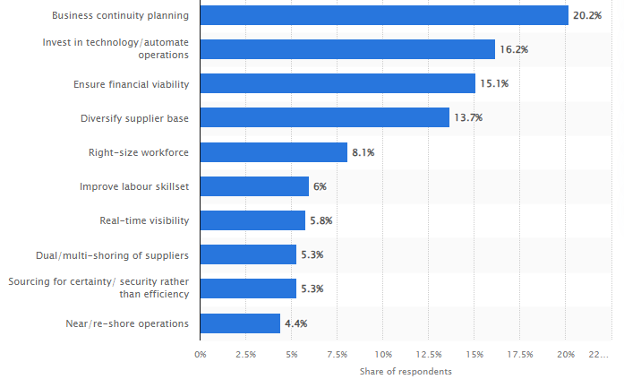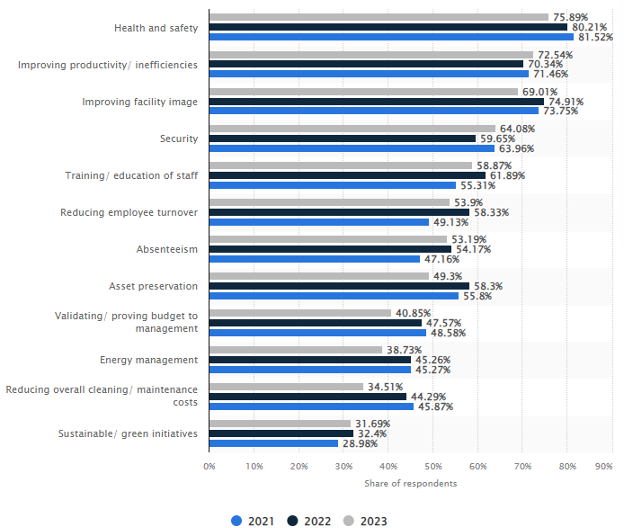In today’s fast-paced and ever-evolving business landscape, Operations Managers have become the backbone of every organization. According to a survey in 2022, the top priority that operations managers must focus on is business continuity planning (20.2%). This is followed soon after by investing in the right technologies (16.2%).

Source: Statista
Each of these activities pertain to a specific skillset, but at the same time are the primary responsibility of the operations manager. This means that COOs must have a broad range of skills that allows them to optimize processes, boost efficiency, and drive operational excellence. All this directly impacts a company’s profitability and competitiveness in the short, medium, and long run.
Regardless of the organization’s size or industry, operations managers must possess a unique set of skills and competencies that set them apart. This article delves into these critical skills, exploring how they contribute to operational success and providing real-world examples to illustrate each skill.
1. Be A Realistic, Yet Effective Communicator
Gone are the days of authoritarian leadership styles where commands were barked, and questions were discouraged. In the modern business world, effective communication and confidence is key to successful operations management.
As an Operations Manager, you must strike a balance between being approachable and delivering clear, concise, and timely messages. However, at the same time you must maintain a balance between your work and life, too.
Insight for COOs:
Strategic Planning: COOs should consider implementing communication tools and platforms that facilitate transparent and timely interactions with their teams. These tools can include project management software, instant messaging apps, and video conferencing solutions.
Challenges to Address:
While adopting these tools, COOs must ensure proper training for their teams to maximize their utility. Additionally, maintaining an open feedback culture can be challenging but is essential for transparent communication.
2. Prioritize Efficiency
Efficiency is the lifeblood of successful operations. It’s not just about doing things right; it’s about doing them in the most optimal way. Operations Managers can significantly impact profitability by embracing efficiency-boosting strategies like the just-in-time approach.
Insight for COOs:
Leveraging Technology: COOs should explore automation and operational analytics tools to identify bottlenecks and areas for improvement within their organizations. These technologies can help in streamlining processes, reducing wastage, and enhancing overall efficiency.
Challenges to Address:
The integration of new technologies can be met with resistance from employees who fear job displacement. COOs must emphasize the benefits of automation, such as freeing up employees to focus on higher-value tasks.
3. Emphasize A Cost-Effective Supply Chain Strategy
A cost-effective supply chain is pivotal for timely and efficient operations. Operations Managers should collaborate closely with logistics partners, manufacturers, and customer service teams to ensure a seamless supply chain. In case there are any disruptions in the supply chain, COOs must have individuals in place to proactively deal with minor issues.
Insight for COOs:
Supply Chain Visibility: COOs can invest in supply chain management software that offers real-time visibility into the movement of goods and materials. This can lead to better decision-making and improved coordination across the supply chain.
Challenges to Address:
Implementing supply chain software can be complex, requiring careful data integration and employee training. Additionally, data security and privacy concerns must be addressed.
4. Prioritize Quality
In today’s competitive market, quality is a critical differentiator. Operations Managers play a pivotal role in ensuring quality at every stage of production or service delivery. A prime example of this is how, from 2021 to 2023, operations managers’ focus on productivity and employee and customer satisfaction increased.
Surveys show that employee security, inefficiency/cost reduction, and green initiatives have become a top issue managers are focusing on in 2023 – much more than in 2021.

Source: Statista
Insight for COOs:
Quality Control Systems: COOs should consider implementing digital quality control systems that monitor and report on product or service quality in real-time. These systems can help identify issues early and prevent costly defects.
Challenges to Address:
Data accuracy and system reliability are paramount when implementing quality control systems. COOs must also ensure that employees are adequately trained to use these tools effectively.
5. Lead Without Micromanaging
Great Operations Managers understand the importance of delegation and trust. While guidance and support are essential, micromanagement can stifle creativity and hinder productivity.
Insight for COOs:
Empowering Teams: COOs can empower their teams by fostering a culture of innovation, autonomy, and self-management. This involves setting clear expectations, providing the necessary resources, and allowing employees the freedom to execute tasks in their own way.
However, empowering teams for high performance is not about relinquishing control entirely; rather, it’s about entrusting your team members with the autonomy to make decisions and take ownership of their tasks. COOs can foster a culture of autonomy and self-management by:
- Setting Clear Expectations: It is important to define specific roles for every team member. This includes outlining goals, timelines, and performance standards. This helps your team understand its role better and perform in a goal-oriented fashion. Furthermore, it enables them to work more independently, freeing COOs up for more important tasks.
- Providing Necessary Resources: Ensure that your teams have the tools, training, and resources required to perform their tasks effectively. This might involve investing in technology, offering training programs, or allocating sufficient budget and personnel.
- Encouraging Innovation: Encourage team members to think creatively and come up with innovative solutions to challenges. Create a safe environment where employees feel comfortable sharing their ideas and experimenting with new approaches.
- Offering Support and Guidance: While promoting autonomy, make it clear that you are available for guidance and support when needed. Team members should feel comfortable seeking assistance or advice when facing complex issues.
- Recognizing and Celebrating Achievements: Acknowledge and celebrate both individual and team achievements. Recognizing and rewarding success can boost morale and motivation, reinforcing a culture of accountability and excellence.
Challenges to Address:
Balancing the need for autonomy with the requirement for accountability can be challenging. COOs must establish performance metrics and KPIs to track progress without stifling creativity. Some key challenges they may face while doing so may include:
- Defining Performance Metrics: Establishing clear performance metrics and Key Performance Indicators (KPIs) is crucial. These metrics help track progress and ensure that team members are aligned with organizational goals. However, setting the right metrics without stifling creativity can be challenging.
- Monitoring Progress: COOs need to strike a balance between monitoring progress and allowing autonomy. Utilize project management tools and regular check-ins to stay informed about ongoing tasks without interfering in the day-to-day execution.
- Dealing with Mistakes: Empowering teams means accepting that mistakes may occur. COOs should foster a culture where mistakes are viewed as opportunities for learning and improvement rather than as failures. Address errors constructively and encourage solutions.
- Ensuring Consistency: Maintaining consistency in decision-making and processes across teams is essential. COOs must provide guidelines and frameworks to ensure that autonomy doesn’t lead to fragmentation or conflicting approaches.
- Adapting to Change: As teams become more self-reliant, COOs may need to adapt their leadership style. This could involve shifting from a directive approach to a more consultative or coaching-oriented one, depending on the needs of each team.
In Conclusion
Operations Managers are the linchpin of efficient and successful organizations – more so now than ever before. Their ability to communicate effectively, prioritize efficiency, manage the supply chain, ensure quality, and lead without micromanaging can make or break a company’s operational performance. As COOs strategize for the future, they should consider how these skills and competencies can be nurtured and enhanced within their organizations, leading to a more competitive and agile business.
By investing in technology, fostering a culture of open communication, and empowering employees, COOs can ensure that their operations teams are equipped with the essential skills needed to thrive in today’s dynamic business landscape.



0 Comments